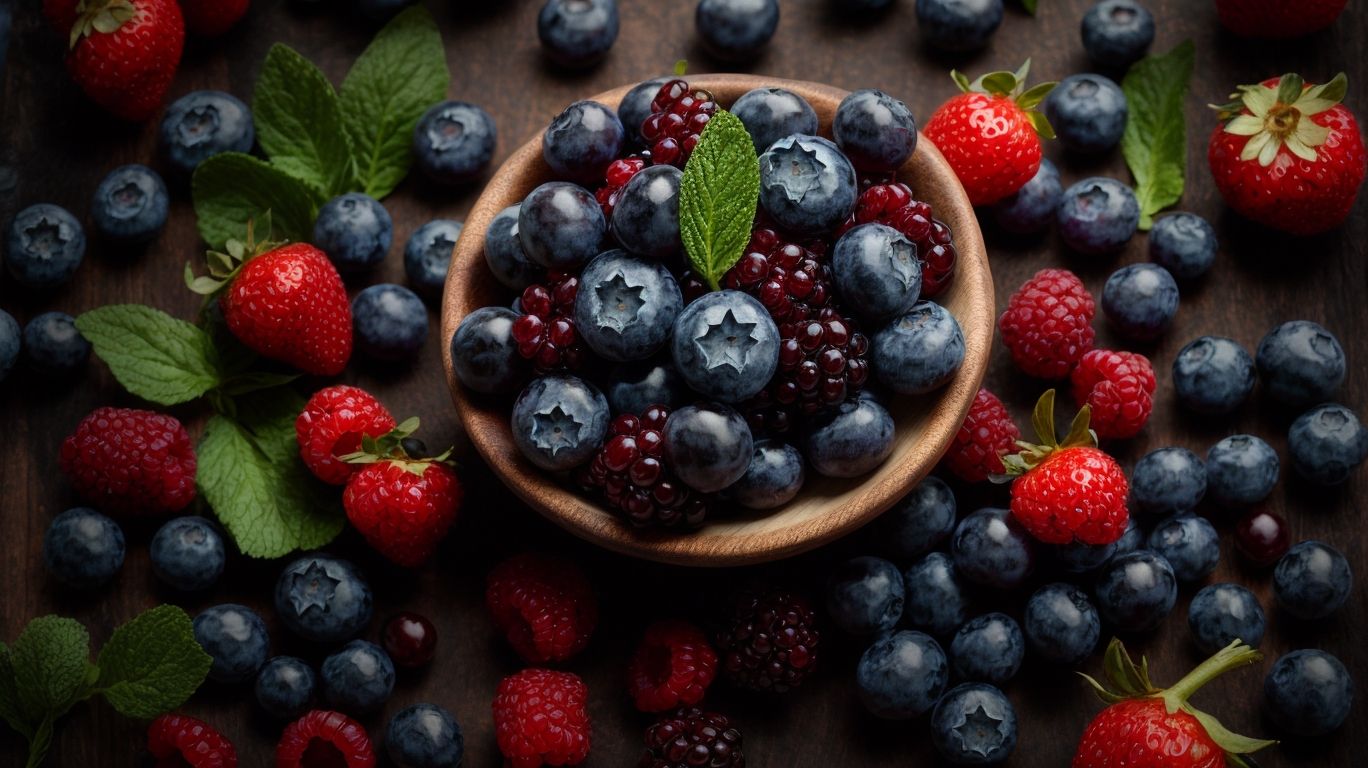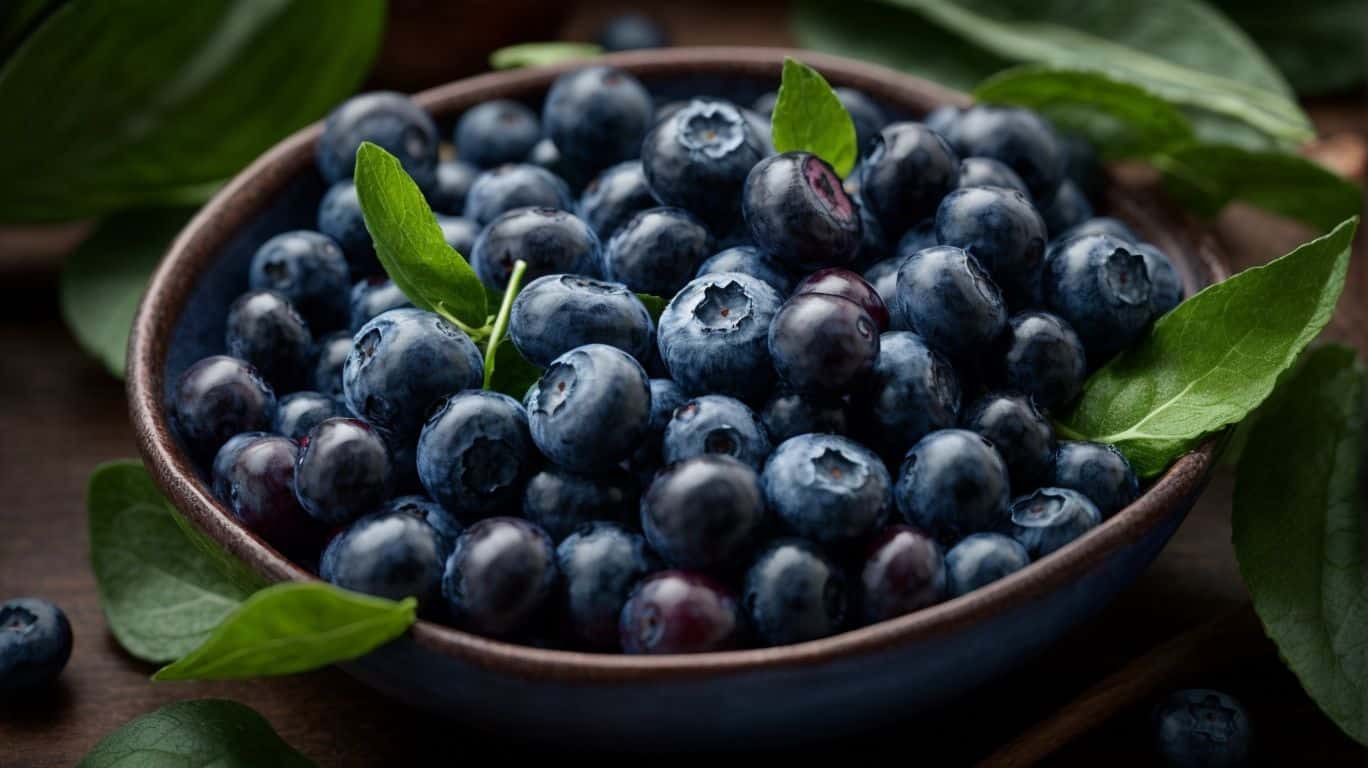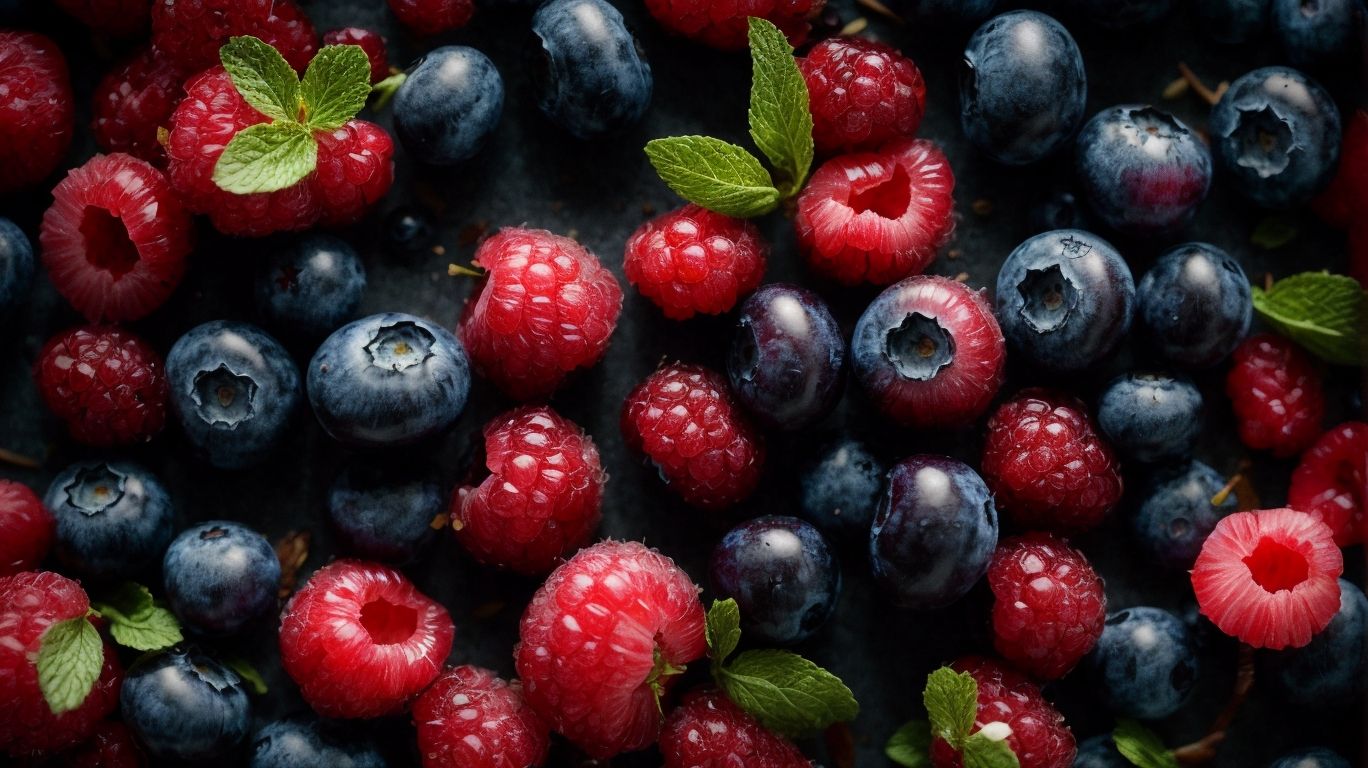The ketogenic diet, or keto diet, is a low-carb, high-fat diet that has gained popularity for its potential weight loss and health benefits. When following a keto diet, it is important to carefully consider the macro-nutrient composition of the foods you consume to ensure they fit within the guidelines of the diet. This article delves into the world of berries, specifically focusing on blueberries, to determine if they are keto-friendly.
To understand if blueberries are keto-friendly, it is essential to examine their macro-nutrient composition. Blueberries are known for their nutritional benefits, but they also contain carbohydrates, which are limited in a keto diet. However, blueberries are relatively low in carbohydrates compared to other fruits. They are also low in fat and protein but contain a moderate amount of fiber. These factors make blueberries a potential fit for a keto diet when consumed in moderation.
Incorporating blueberries into a keto diet can have several benefits. Blueberries are packed with essential vitamins, minerals, and antioxidants, making them a nutritious addition to any diet. They are also known for their potential role in regulating blood sugar levels and promoting brain health. When consuming blueberries on a keto diet, it is crucial to practice portion control and moderation due to their carbohydrate content.
In addition to blueberries, there are other keto-friendly berries to consider, such as strawberries, raspberries, and blackberries. These berries also have relatively low carbohydrate content and can be enjoyed in moderation while following a keto diet.
By understanding the macro-nutrient composition of blueberries and considering their benefits and ways to incorporate them into a keto diet, individuals can make informed choices to enjoy the flavors and goodness of berries while staying on track with their keto lifestyle.
What Does “Keto” Mean?

Photo Credits: Ieatketo.Com by Jose Hall
“Keto” refers to the ketogenic diet, a low-carb, high-fat diet that induces ketosis in the body. In this state, the body burns fat instead of carbohydrates for energy, leading to weight loss and improved overall health. The keto diet mainly consists of low-carb, high-fat foods like meat, fish, eggs, dairy, and non-starchy vegetables. However, it’s essential to remember that not all foods are keto-friendly due to their higher carbohydrate content. To succeed on a keto diet, prioritize whole, nutrient-dense foods and stay away from processed products.
Are Blueberries Keto-Friendly?

Photo Credits: Ieatketo.Com by Logan Perez
Are Blueberries Keto-Friendly?
Blueberries are indeed keto-friendly and can be enjoyed in moderation as part of a keto diet. While they contain more carbs compared to other berries, their net carb content remains relatively low. A 1/2 cup serving of blueberries contains approximately 9 grams of net carbs. Therefore, if you are strictly following a keto diet, it is crucial to be mindful of your portion size when consuming blueberries. Additionally, it’s essential to maintain a proper macronutrient balance in your meals and snacks. Incorporating blueberries into a well-planned keto meal can provide both variety and essential nutrients. Just make sure to keep track of your intake and stay within your daily carb limit.
Fun Fact: Blueberries get their vibrant blue color from the antioxidants they are packed with!
Understanding the Macro-Nutrient Composition of Blueberries
Understanding the macro-nutrient composition of blueberries is essential when considering their compatibility with the keto diet. Blueberries have a relatively low carbohydrate content, containing approximately 11 grams per 100 grams of fruit. In terms of fat, blueberries are low as well, with less than 1 gram per serving. While blueberries are not a significant source of protein, they do provide about 0.7 grams per 100 grams. However, what makes them stand out is their high fiber content, contributing approximately 2 grams per serving. It is crucial for individuals following a keto diet to comprehend these macro-nutrients as they must maintain a specific balance of carbohydrates, fat, and protein in their intake.
Are Blueberries Low in Carbohydrates?
Yes, blueberries are indeed low in carbohydrates. They are a fantastic addition to a keto diet as they have a lower amount of net carbs compared to other fruits. Blueberries have approximately 10 grams of net carbs per 1/2 cup serving, which makes them a suitable choice for individuals who follow a low-carb or keto diet. Furthermore, blueberries are rich in various vitamins, minerals, and antioxidants that offer numerous health benefits. Therefore, if you’re seeking a delicious and nutritious fruit that aligns with your low-carb lifestyle, blueberries are definitely an excellent option to consider.
Are Blueberries High in Fat?
Are Blueberries High in Fat?
Blueberries are not high in fat. In fact, they are a low-fat fruit option that can be incorporated into a keto diet. Blueberries contain less than 1 gram of fat per cup, making them a good choice for those following a low-carb, high-fat eating plan. While blueberries may not contribute significant amounts of fat to the diet, they are rich in other nutrients like vitamins, minerals, and antioxidants. Incorporating blueberries into a keto diet can provide a flavorful and nutritious addition without adding excess fat. So, if you’re wondering, “are blueberries high in fat?” the answer is no.
Are Blueberries a Good Source of Protein?
Blueberries are a nutritious fruit, but they are not a significant source of protein. Despite their numerous health benefits, blueberries only contain approximately 0.7 grams of protein per 100 grams. Therefore, if you are wondering, “Are blueberries a good source of protein?” the answer is no. If you are looking to increase your protein intake, there are other food options that would be more suitable. Consider incorporating lean meats, poultry, fish, dairy products, legumes, or tofu into your diet for a higher protein content. However, blueberries can still be a valuable addition to a keto diet because of their low carbohydrate content.
Are Blueberries High in Fiber?
Blueberries are indeed high in fiber, as they are considered a good source of dietary fiber. A 100 gram serving of blueberries contains about 2.4 grams of fiber. Consuming an adequate amount of fiber is important for maintaining a healthy digestive system, promoting regular bowel movements, and aiding in weight management.
In addition to their fiber content, blueberries also provide other nutritional benefits. They are rich in antioxidants, vitamins, and minerals, which contribute to overall health and wellbeing.
To incorporate blueberries into your diet, you can add them to your morning cereal or yogurt, blend them into smoothies, or simply enjoy them as a healthy snack on their own.
Including blueberries in your meals can provide you with a delicious and nutritious way to boost your fiber intake. So, are blueberries high in fiber? Absolutely!
Benefits of Blueberries in a Keto Diet

Photo Credits: Ieatketo.Com by Roy Young
Looking to enhance your keto diet with a burst of flavor? Look no further than blueberries! These powerful little berries offer a range of benefits that can support your keto journey. Discover the nutritional advantages, the impact on blood sugar regulation, the role of blueberries in brain health, and the incredible antioxidant properties. Get ready to enrich your ketogenic lifestyle with the countless advantages blueberries have to offer!
The Nutritional Benefits of Blueberries
The nutritional benefits of blueberries make them a valuable addition to a keto diet. Blueberries, known for their nutritional benefits, are rich in antioxidants, which help protect against oxidative stress and inflammation. Moreover, they are high in fiber, promoting healthy digestion and aiding in weight management. With only low calories, blueberries become a guilt-free snack option. These super berries are also loaded with vitamins and minerals, including vitamin C and manganese. Additionally, blueberries possess potent anti-inflammatory properties that may help reduce the risk of chronic diseases. By incorporating blueberries into your keto diet, you can enhance the nutritional value of your meals while enjoying the delicious taste of these nutritional superstars.
Blueberries and Antioxidants
Blueberries, also known as a superfood, are packed with powerful antioxidants, making them an excellent addition to a keto diet. These antioxidants play a crucial role in protecting our cells from the harmful effects of free radicals. Let’s explore some key points about the extraordinary combination of blueberries and antioxidants:
- Unbeatable antioxidant power: Blueberries stand out among all fruits and vegetables with their exceptionally high levels of antioxidants.
- Fighting inflammation: The antioxidants found in blueberries contribute to reducing inflammation in the body, which ultimately promotes overall health and well-being.
- Guarding heart health: Consuming blueberries regularly has been linked to a reduced risk of heart disease by effectively lowering bad cholesterol levels and improving blood pressure.
- Boosting brain health: Blueberries have gained recognition for their ability to enhance brain function and slow down mental decline due to their abundance in antioxidants.
- Promoting longevity and combating aging: The antioxidants present in blueberries possess incredible anti-aging properties, helping to slow down the aging process and promote longevity.
Blueberries and Blood Sugar Regulation
Blueberries have been found to have a positive impact on blood sugar regulation, making them an excellent choice for individuals who are following a keto diet. Incorporating blueberries into your meals can help support stable blood sugar levels and make your diet more enjoyable. The low glycemic index (GI) of around 53 that blueberries possess means they have a minimal effect on blood sugar levels. Furthermore, blueberries are rich in fiber, which aids in slowing down the absorption of glucose into the bloodstream. This, in turn, helps prevent spikes in blood sugar and contributes to improved glucose control. For those following a keto-friendly eating plan, incorporating blueberries into desserts or enjoying them as a low-carb snack is a pro-tip worth considering.
Blueberries and Brain Health
Including blueberries in a keto diet can have positive effects on brain health.
- Rich in antioxidants: Blueberries, known for their remarkable content of antioxidants, play a crucial role in protecting the brain from oxidative stress and inflammation.
- Improved cognitive function: Numerous studies have suggested that the compounds found in blueberries possess the ability to enhance memory and overall cognitive function.
- Reduced risk of neurodegenerative diseases: The antioxidants present in blueberries have been associated with a decreased likelihood of developing conditions such as Alzheimer’s disease and dementia.
- Anti-inflammatory properties: Blueberries contain beneficial anti-inflammatory compounds that aid in reducing inflammation in the brain, subsequently contributing to improved brain health.
Blueberries have been consumed for centuries and were integral to the Native American diet due to their medicinal properties, particularly in relation to brain health.
Incorporating Blueberries into a Keto Diet

Photo Credits: Ieatketo.Com by James Roberts
Incorporating luscious blueberries into a keto diet? Absolutely possible! Get ready to satisfy your sweet cravings while staying on track with your low-carb eating plan. From mastering portion control and finding the right balance to discovering delectable meal ideas and recipes featuring these antioxidant-rich berries, we’ll show you how to make blueberries a delightful part of your keto journey. And guess what? We’ll even reveal how you can combine blueberries with other keto-friendly foods for a burst of flavor that will leave you drooling for more. Let’s dive into the berry world!
Portion Control and Moderation
When incorporating blueberries into a keto diet, it is crucial to practice portion control and moderation. Here are some helpful tips:
- Ensure accurate serving sizes: Use a food scale or measuring cups to precisely portion out the desired quantity of blueberries.
- Limit your consumption: While blueberries can be part of a keto diet, it is important to avoid overindulging. Stick to a reasonable serving size to stay within the carb limits.
- Create a balanced meal or snack: Pair blueberries with other keto-friendly foods to achieve a well-balanced macronutrient meal or snack.
- Monitor your intake: Keep track of the amount of blueberries you eat to ensure it aligns with your desired carb range.
Fact: In a keto diet, portion control is crucial because one cup of blueberries contains approximately 17 grams of carbohydrates.
Meal Ideas and Recipes with Blueberries
When it comes to incorporating blueberries into a keto diet, there are a variety of meal ideas and recipes that you can try. Here is a table presenting some examples of
| Meal Idea/Recipe | Ingredients | Instructions |
|---|---|---|
| Blueberry Smoothie | Almond milk, spinach, blueberries, chia seeds, and almond butter | Blend all ingredients together until smooth. Serve chilled. |
| Blueberry Salad | Mixed greens, blueberries, feta cheese, walnuts, and balsamic vinaigrette dressing | Toss all ingredients together in a salad bowl. Drizzle dressing over the salad and serve. |
| Blueberry Chia Pudding | Chia seeds, almond milk, Greek yogurt, blueberries, and honey (optional) | In a jar, mix chia seeds, almond milk, and Greek yogurt. Let it sit overnight. Top with blueberries and drizzle honey if desired. |
These recipes offer a delicious way to enjoy blueberries while staying within the guidelines of a keto diet. Have fun incorporating blueberries into your keto meals and reap the health benefits they provide.
Combining Blueberries with Other Keto-Friendly Foods
Combining blueberries with other keto-friendly foods can enhance the taste, nutritional value, and variety of your meals. Here is a table showcasing some keto-friendly food options that pair well with blueberries:
| Food | Nutritional Benefit |
|---|---|
| Greek yogurt | Adds protein and creaminess to your blueberry parfait |
| Almonds | Provides healthy fats and crunch in a blueberry nut mix |
| Chia seeds | Adds fiber and omega-3s to your blueberry smoothie |
| Coconut milk | Creates a creamy base for blueberry coconut ice cream |
| Spinach | Mixes well in blueberry spinach salads |
By combining blueberries with these keto-friendly foods, you can create delicious and nutritious meals that align with a keto diet’s low-carb and high-fat principles.
Other Keto-Friendly Berries

Photo Credits: Ieatketo.Com by Peter Brown
Looking beyond blueberries, let’s explore other keto-friendly berries that can fit seamlessly into your low-carb lifestyle. Get ready to tantalize your taste buds as we delve into the world of strawberries, raspberries, and blackberries. These juicy delights not only offer a burst of flavor but also boast impressive health benefits. So, let’s dig in and discover how these delectable berries can enhance your keto journey.
Strawberries
Strawberries are a keto-friendly fruit, as they are low in carbohydrates and high in fiber. Incorporating strawberries into a keto diet can provide various health benefits. They are rich in essential vitamins and minerals, including vitamin C, manganese, and folate. Strawberries are also packed with antioxidants, which help protect the body against oxidative stress and inflammation. They have a low glycemic index, which means they have a minimal impact on blood sugar levels. Enjoy strawberries in moderation as part of a well-balanced keto meal plan by adding them to salads, smoothies, or enjoying them as a snack.
| Strawberries are a keto-friendly fruit, as they are low in carbohydrates and high in fiber. |
| They provide essential vitamins and minerals, including vitamin C, manganese, and folate. |
| Strawberries are packed with antioxidants, which protect against oxidative stress and inflammation. |
| They have a low glycemic index, causing minimal impact on blood sugar levels. |
| Incorporate strawberries into a keto diet by adding them to salads, smoothies, or enjoying them as a snack. |
Raspberries
, a keto-friendly berry, are low in carbs and high in fiber, making them a great addition to a keto diet. In a 100g serving, raspberries contain only 5.4g of net carbs and 6.5g of fiber. They also provide essential vitamins and minerals like vitamin C and manganese. Raspberries are known for their antioxidant properties, which can help fight inflammation and oxidative stress. Incorporating raspberries into a keto diet is easy – they can be enjoyed as a snack, added to smoothies, or used in keto-friendly recipes like chia seed pudding or low-carb desserts.
Blackberries
Blackberries are a delectable and keto-friendly fruit that can be savored on a ketogenic diet. They are rich in fiber, low in carbohydrates, and packed with a generous amount of antioxidants. Integrating blackberries into a keto diet is effortlessly achievable and can be accomplished in numerous ways. They can be relished as a standalone snack, tossed into salads, or utilized in keto-friendly recipes like refreshing blackberry smoothies or tempting desserts. In addition to blackberries, other keto-friendly berries such as strawberries, raspberries, and blueberries can be included. By incorporating a variety of berries into your diet, you not only enhance the taste but also provide your body with vital nutrients. Enjoy the delightful allure of these berries while adhering to your keto lifestyle.
Some Facts About “Are Blueberries Keto? Delving into the Berry World”:
- ✅ Blueberries contain around 21 grams of carbohydrates per cup, with 15 grams being sugars. (Source: ketobell.net)
- ✅ Fresh blueberries are preferred over dried ones as drying concentrates their sugars and carbs. (Source: ketobell.net)
- ✅ Berries, avocado, certain melons, and citrus fruits are alternatives to blueberries on a keto diet. (Source: ketobell.net)
- ✅ Blueberries offer nutritional benefits like antioxidants, vitamin C, and dietary fiber. (Source: ketobell.net)
- ✅ Moderation and mindful consumption are important when incorporating blueberries into a keto diet. (Source: ketobell.net)
Frequently Asked Questions
Are blueberries keto-friendly?
Blueberries contain a relatively high amount of carbohydrates, with around 21 grams per cup, and 15 grams of sugar. This can raise concerns for those following a keto diet, as it focuses on burning fat instead of carbs to achieve ketosis. While fresh blueberries are better than dried ones, as drying concentrates their sugars and carbs, they may not align with strict keto goals. However, blueberries can still be enjoyed in moderation, as they offer nutritional benefits like antioxidants, vitamin C, and dietary fiber.
What are the best berries for a keto diet?
Berries are a great option for those following a ketogenic diet due to their low sugar content and high nutritional value. They are rich in antioxidants, fiber, and important vitamins like vitamin C. When incorporating berries into meals, you can satisfy sweet cravings without causing blood sugar spikes or overeating. Different types of berries have varying net carb and sugar content, so it’s important to choose wisely. Strawberries have lower carbs with 8.1 grams of net carbs and 7 grams of sugar per cup, while raspberries have only 5 grams of net carbs per half-cup serving due to their high fiber content. Blueberries, with around 17 grams of net carbs per cup, are still acceptable in moderation.
How do I calculate net carbs on a keto diet?
Understanding net carbs is crucial on a ketogenic diet, as they represent digestible carbohydrates that impact blood glucose levels. Net carbs can be calculated by subtracting dietary fiber and certain sugar alcohols from the total carbohydrates of a food item. By monitoring the net carb content, you can maintain ketosis and make smart dietary choices.
Can I eat other fruits on a keto diet?
While some fruits like blueberries may not be suitable for strict keto adherents due to their higher carb content, there are still many keto-friendly fruits available. Berries, avocado, tomatoes, olives, and coconut are all low in carbs and can be incorporated into a keto diet. Berries provide essential vitamins, fiber, and antioxidants, while avocado is high in healthy fats and nutrients. Tomatoes contain vitamin C, potassium, and the antioxidant lycopene. Olives are a great source of healthy fats and antioxidants. Coconut in various forms can increase ketone production.
Which fruits should I avoid on a keto diet?
There are certain fruits that are best to avoid on a keto diet due to their high sugar and carbohydrate content. Bananas, grapes, pineapple, and mangoes are all examples of fruits that are high in natural sugars and carbs, making it difficult to fit them into a keto diet. To maintain ketosis, it’s important to be mindful of your sugar intake and choose fruits with lower carbohydrate content.
What are some practical tips for incorporating berries into a keto meal plan?
When including berries in your keto meal options, here are some practical tips to keep in mind:
– Track your daily carb intake to ensure you stay within your desired range and maintain ketosis.
– Choose fresh berries over dried ones, as dried berries tend to have more concentrated sugars and carbs.
– Be mindful of portion sizes and incorporate berries into keto-friendly recipes like salads, smoothies, or low-carb desserts.
– Balance your nutrient intake by including other low-carb, nutrient-dense fruits and vegetables in your meals.
– Consider the overall context of your diet and daily carb allowance when enjoying berries as a sweet treat.


